23 Effective Baby Teething Remedies

- Why Does Teething Hurt a Baby?
- Signs and Symptoms of Teething in Babies
- Ways to Ease Teething Pain in Babies
- Home Remedies for Teething in Babies
- How Long Does Teething Last?
- FAQs
- Infographic: Easy Home Remedies for Teething Pain in Babies
The medical term for teething is called ‘Odotiasis’. The teething process generally continues between the 6th and 24th months in babies, causing discomfort and irritability. During this time, the teeth start to erupt from the gums, which can be painful for infants. Parents often seek baby teething remedies to soothe their child’s sore gums. The first two teeth which erupt are the top and bottom center teeth, also known as the incisors. The rest of the teething process follows an outward pattern, with canines and premolars appearing next, ending with the molars. Providing gentle gum massages or chilled teething rings can offer relief. Understanding teething remedies for babies helps caregivers manage this challenging phase effectively.
The lower and upper central and lateral incisors emerge in sets of 2 each, and the molars, canines, and second molars appear in sets of 4 (1).
Why Does Teething Hurt a Baby?
The process of teething is painful and causes discomfort to the baby. This is because the tooth starts to move beneath the surface of the gum tissue which causes the area to become red, swollen and sensitive (2). Some teeth, like the molars, hurt more as they are more sensitive than others, owing to a larger surface area.
Signs and Symptoms of Teething in Babies
There are no particular signs or symptoms of teething. These symptoms could last for a few days or spread over a few months if a lot of teeth start to erupt at the same time. This causes the gums to start hurting as they are still sensitive. Teething may cause the following symptoms (3) –
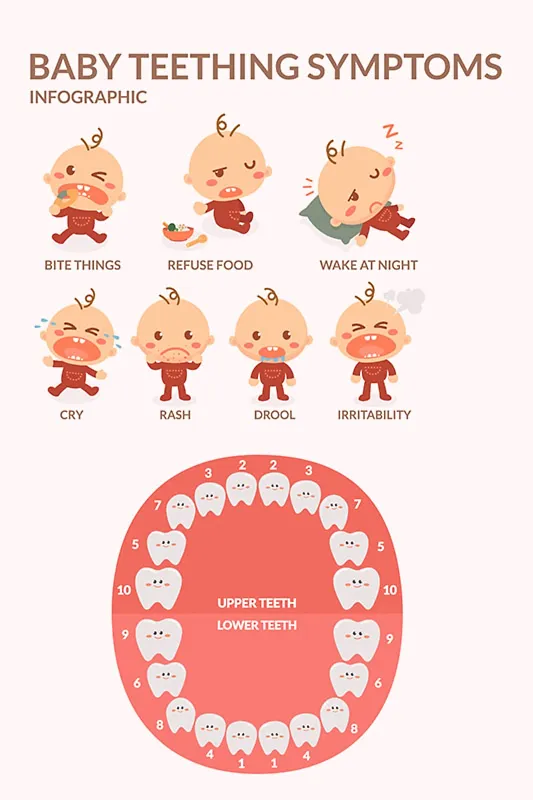
1. Profuse Drooling
Teething stimulates drooling, which means that the baby’s clothes are going to be constantly wet and soggy.
2. Coughing
Constant drooling can cause the baby to gag and cough. However, this is not a cause for concern if there are no other signs of cold and flu.
3. Teething Rash
The constant dripping may cause chapping, redness and rashes around the baby’s mouth and chin.
4. Biting
Teething causes pressure from the emerging teeth which poke through the gums and cause discomfort to the baby.
5. Crying
The pain and discomfort are different for each baby. While some may breeze through comfortably, others suffer a lot due to the inflammation of the gum area.
6. Irritability
Babies become irritable and fussy during the teething process because the teeth will keep poking into the gum surface.
7. Refusal to Feed
A cranky, uncomfortable baby may be soothed by feeding, as they will have something in their mouth.
8. Waking in the Night
The teething discomfort may cause the baby’s sleep to be disrupted.
9. Pulling the Ear and Rubbing the Cheek
Babies who are teething may tend to tug at their ear or rub their chin or cheek.
The severity of discomfort caused by teething varies from baby to baby and you can consult a doctor if you feel that it requires professional assistance.
Ways to Ease Teething Pain in Babies
Once you are sure that the teething process has started, you can use some medicine for teething babies to ease out pain and discomfort like :
1. Natural Remedies
There are some natural teething baby remedies which can be used to provide relief to the baby.
2. Lower Inflammation
The teething process causes inflammation, which stimulates the nerves in the gum. Hence, reducing the inflammation will help to reduce the baby’s pain.
3. Paleo-Type Foods
Providing paleo-type foods is very beneficial. This includes foods like fresh fruits and vegetables, pasteurised meat and healthy fats like coconut butter.
4. Rest and Healthy Food
You should ensure that the baby gets enough rest and healthy food in addition to formula and breast milk.
5. High Protein Foods
Lowering stress levels by lowering blood pressure. This can be done by feeding the baby with whole foods which are high in protein.
6. Cold Substances
Cold and pressure are two of the oldest tricks to combat teething pain and excellent remedies. Cold substances like a little ice or a cloth help numb the area and pressure soothe the inflamed gums.
7. Homoeopathy
Homoeopathic medicines for teething in infants can be tried to relieve the baby from redness, swelling and pain, and keep the baby calm.
8. Professional Assistance
There are medicines that can be administered by doctors if teething problems are too severe. Depending on the stage of teething, specific medicines are given.
9. Over-the-Counter Drugs
If home remedies are not helping much, then you may give the baby some over-the-counter medicines. You should have your baby evaluated by the paediatrician before giving any medication if teething is severe.
10. Distraction
If you can distract your baby with some activities, they will forget about the pain for a while.
Home Remedies for Teething in Babies
How to soothe a teething baby? There are a variety of ways to soothe pain caused by teething and there are home remedies too that can be utilised if you do not want to go the medicine way (4).

1. Frozen Cloth
A simple yet effective natural teething remedy for infants is giving your baby a clean, damp washcloth that has been chilled in the freezer (not frozen solid). The cold texture helps numb the gums, while the fabric provides a gentle chewing surface. Ensure the cloth is free from loose threads to avoid choking hazards.
2. Frozen Fruits & Vegetables
Chilled or partially frozen fruits and vegetables can provide relief. Always use a mesh feeder to prevent choking. Avoid hard frozen foods that could hurt delicate gums.
3. Natural Solid Wooden Toys
Wooden teethers (made from untreated, baby-safe wood) are excellent because their slightly rough texture massages sore gums. Ensure the toy is splinter-free, non-toxic, and large enough to prevent swallowing.
4. Clean Finger Massage
Gently rubbing your baby’s gums with a clean finger (or a silicone finger brush) can help relieve pressure. The pressure mimics the sensation of chewing, providing temporary relief. Wash your hands thoroughly before doing this.
5. Teething Biscuits
Unsweetened, hard teething biscuits (like baby rusks) are designed to soften as the baby gnaws, reducing gum irritation. Always supervise your baby to prevent breaking off large pieces.
6. Cold Feeding Bottle
If your baby uses a bottle, try freezing it upside down so the nipple becomes firm but not icy. The coolness helps numb the gums while the sucking motion provides comfort.
7. Chilled Bananas
Bananas are soft and easy to gum, making them a safe, soothing snack. For extra relief, slightly freeze a banana (not too hard) before giving it to your baby in a mesh feeder.
8. Cold Carrot Sticks
A chilled (not frozen) carrot stick can be a great natural teether. These can be given to babies as they are hard enough to chew on and will help your kid when they are teething. Always ensure you’re around because pieces could break off and end up being swallowed and get stuck in the baby’s throat. A chilled (not frozen) carrot stick can be a great natural teether.
9. Cold Applesauce or Yogurt
Chilled unsweetened applesauce or yogurt can be both soothing and nutritious. The cool temperature helps numb sore gums while providing a tasty distraction.
10. Vanilla Extract Rub
A tiny dab of alcohol-free vanilla extract on the gums can have a mild numbing effect. The sweet taste is often comforting to babies. Always use food-grade vanilla and consult your pediatrician first.
11. Ginger Root
A small, peeled piece of fresh ginger root can act as a natural anti-inflammatory. Let your baby gently gnaw on it (under supervision) to help reduce gum swelling and pain.
12. Chamomile Tea (Cold)
Brew a weak chamomile tea, chill it, and dip a clean cloth in it before letting your baby chew. Chamomile has natural calming properties that can ease discomfort.
13. Breast Milk Popsicles
For breastfeeding moms, freezing expressed breast milk into small popsicles (using a silicone feeder) provides comfort and nutrition while soothing sore gums.
These were some easy home remedies for teething infants.
How Long Does Teething Last?
The process of teething varies for each baby. While in some babies, the first tooth may come through at 6 months, or as late as the first birthday of the baby. The entire process could take about 2 years.
Teething timelines (approximate) –

- Central incisors: at the age of 6-12 months
- Lateral incisors: at the age of 9-16 months
- Canine teeth: at the age of 16-23 months
- First molars: at the age of 13-19 months
- Second molars: at the age of 22-24 months
Teething lasts about a week per tooth, it starts a few days before the first tooth erupts and lasts until a few days after the last tooth has erupted.
FAQs
1. Can teething cause a runny nose or diarrhea?
While many parents report these symptoms during teething, there’s no scientific proof that teething directly causes diarrhea or a runny nose. However, excessive drooling may lead to mild facial rashes, and babies tend to chew on everything, increasing exposure to germs. If symptoms persist, consult a pediatrician to rule out illness.
2. Do amber teething necklaces really work?
Amber teething necklaces are not medically proven to relieve pain and can pose serious choking and strangulation risks. The claim that amber releases pain-relieving succinic acid when warmed by skin lacks scientific backing. The AAP (American Academy of Pediatrics) strongly discourages their use due to safety hazards (5).
Teething is a difficult phase for both the baby and caregivers, but it is also an important developmental stage. Being empathetic to the needs of the baby and accepting the phase as a transitory and necessary one goes a long way in soothing any anxiety you may be feeling.
Infographic: Easy Home Remedies for Teething Pain in Babies
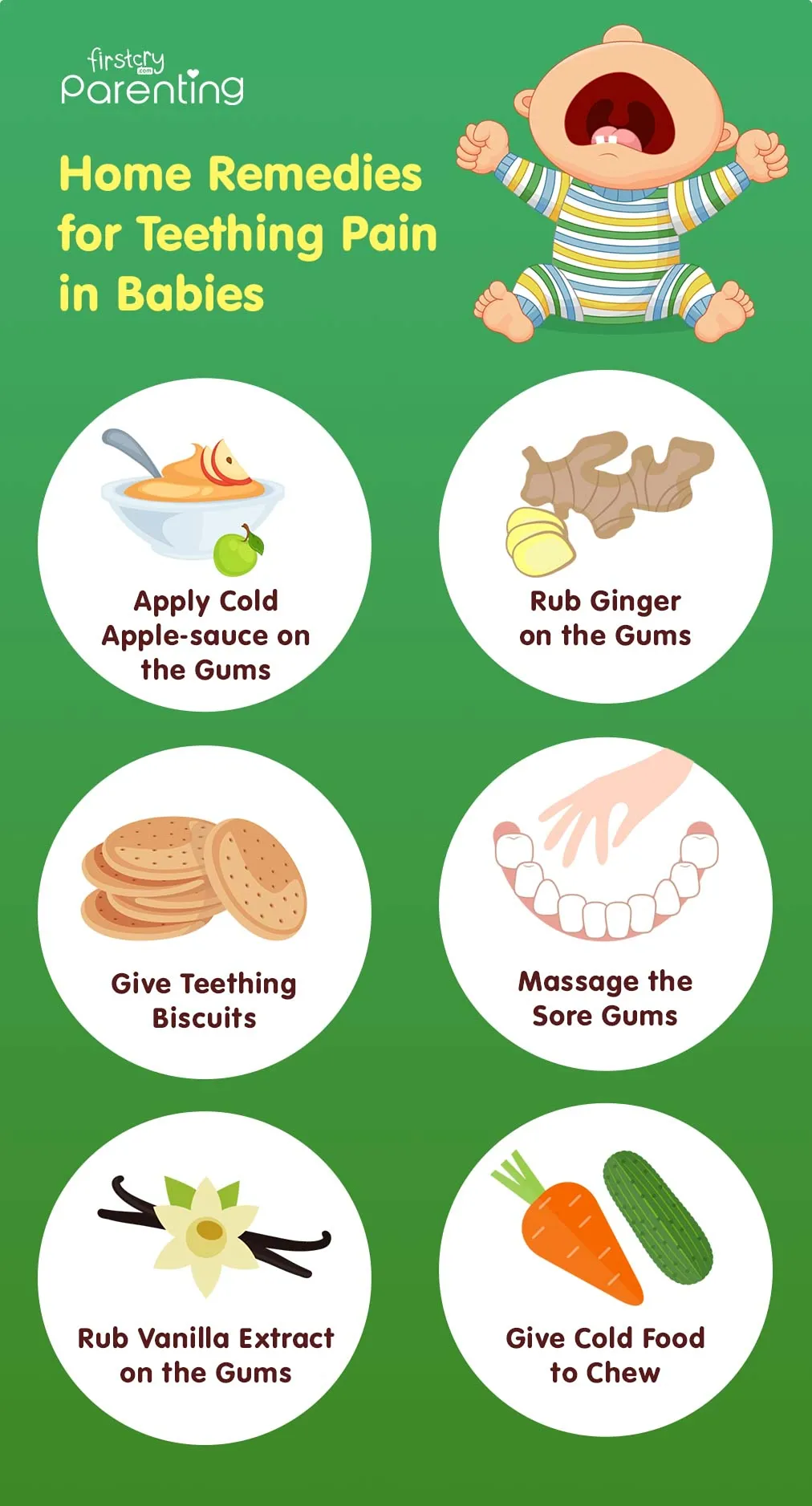
References/Resources:
1. Cleveland Clinic – Teething/Teething Syndrome
2. American Academy of Pediatrics – Baby Teething Pain
3. NHS – Baby teething symptoms
4. Better Health Channel – Teeth development in children
5. American Academy of Pediatrics – Teething Necklaces and Beads: A Caution for Parents
Also Read:
Teething in Babies
3 Month Old Teething
Symptoms of Teething in Babies
Ways to Get a Teething Baby to Sleep
Was This Article Helpful?
Parenting is a huge responsibility, for you as a caregiver, but also for us as a parenting content platform. We understand that and take our responsibility of creating credible content seriously. FirstCry Parenting articles are written and published only after extensive research using factually sound references to deliver quality content that is accurate, validated by experts, and completely reliable. To understand how we go about creating content that is credible, read our editorial policy here.









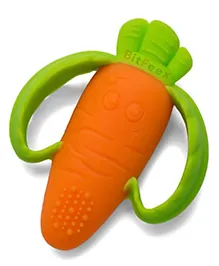

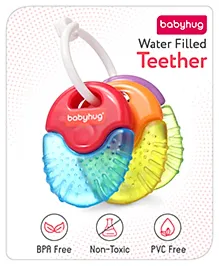

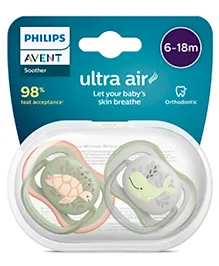
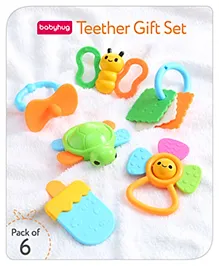
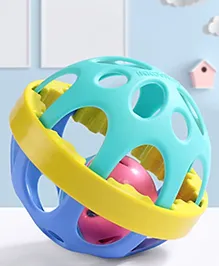
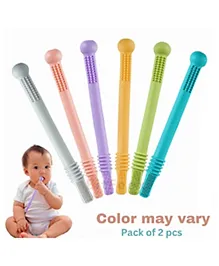

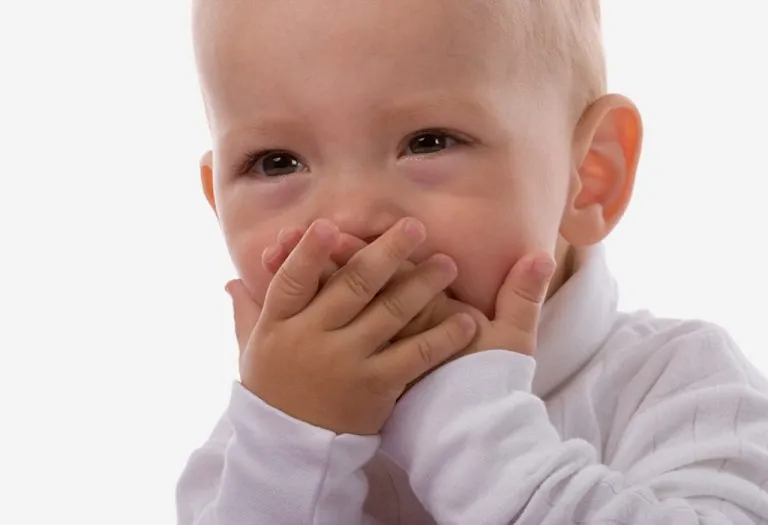






.svg)


















